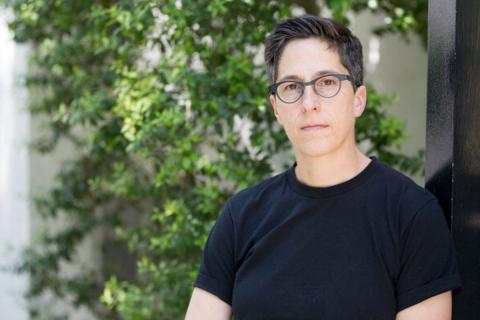
I first heard of Alison Bechdel’s Fun Home: A Family Tragicomic when my undergraduate alma mater College of Charleston assigned it as part of its Summer 2013 “College Reads!” program—a non-required reading program designed to create a unifying and educational experience for its students, staff, and faculty. (When I was an incoming freshman there, in its first year of the “College Reads!” program, all freshmen read Everything You Think You Know About Politics…And Why You Are Wrong by Kathleen Hall Jamieson. Other past texts include Eating Animals by Jonathan Safran Foer, The Things They Carried by Tim O’Brien, and Jewel by Brett Lott—all evidence that the college does not shy away from potentially controversial content.) Consequently, after word spread about one CofC parent who expressed concerns about Fun Home’s potentially contentious subject matter, Republican state Rep. Garry Smith proposed (and succeeded in imposing) a cut of $52,000 from the 2014-2015 state budget’s funding for CofC. $52,000 was exactly what the university spent on providing copies of Fun Home. Welcome to South Carolina.
 There were protests by students and faculty alike. But most importantly, the cast of Fun Home (the graphic memoir was turned into a musical after its 2006 publication) viewed the budget cuts as a form of censorship. They volunteered to perform in Charleston selected songs from the musical without pay. At $15 a ticket, the few shows quickly sold out. I was proud of CofC, but I was also curious about the text itself and why it had caused such a stir in my home state.
There were protests by students and faculty alike. But most importantly, the cast of Fun Home (the graphic memoir was turned into a musical after its 2006 publication) viewed the budget cuts as a form of censorship. They volunteered to perform in Charleston selected songs from the musical without pay. At $15 a ticket, the few shows quickly sold out. I was proud of CofC, but I was also curious about the text itself and why it had caused such a stir in my home state.
Fun Home depicts the author growing up in rural Pennsylvania. It focuses on the complex relationship she has with her father. In chronicling this relationship, Bechdel delves into subject matter ranging from gender expression and gender roles to dysfunctional families and suicide. Since its publication, it has garnered many award nominations: two weeks on the New York Times Best Seller List, the National Book Critics Circle Award nomination, three Eisner Award nominations (and one win). Several publications named it a best book of 2006: The New York Times, Amazon.com, The Times of London, New York magazine, Publishers Weekly, Salon.com, Entertainment Weekly, Time, among others.
In 2012, Bechdel published Are You My Mother?: A Comic Drama as a companion piece to Fun Home. It focuses on her relationship with her mother. Are You My Mother? won the 2013 Judy Grahn Award for Lesbian Non-Fiction, and it shortlisted for the 2013 Lambda Literary Award for Lesbian Memoir or Biography. Most recently in 2014, Bechdel was awarded a MacArthur “Genius” Grant.
In addition to its awards and mentions, Bechdel’s work represents a powerfully unique approach to graphic writing. When I first read it, I was struck by its deceptively simple visual style, its seemingly straightforward narrative, and its ease of reading—I finished it in under a day. But upon multiple re-readings, I realized more and more how intricately Bechdel layers her narrative and graphics. Like any great graphic novel or memoir, every single page (let alone every single frame) hides a multitude of precise rhetorical decisions on the author’s part, decisions that warrant closer and closer readings to ferret out the genius hidden therein. I found myself continually surprised by the increasing amount of visual clues and by the depth of thought behind such decisions to include drawn photographs, journal entries, and explicit allusions to all kinds of other literature. Moreover, her work is emotionally wrought to a variety of highs and lows, living up to its subtitles: a Tragicomic and a Comic Drama.
When I read Bechdel’s two graphic memoirs, I am allowed more than just a passing glimpse into a complex, well-rendered childhood; I become part of her growing family of empathizers and admirers—which now includes College of Charleston’s student and faculty body—and I am thrilled to be able to share this family with Lighthouse classes of my own.
 Alexander Lumans has been awarded fellowships and scholarships to the MacDowell Colony, Bucknell University, Blue Mountain Center, ART342, Norton Island, RopeWalk Writers Retreat, Bread Loaf Writers’ Conference, and Sewanee Writers’ Conference. He received the 2013 Gulf Coast Fiction Prize, 3rd place in the 2012 Story Quarterly Fiction Contest, and the 2011 Barry Hannah Fiction Prize from The Yalobusha Review.His fiction has appeared or is forthcoming in Story Quarterly, Gulf Coast, Blackbird, Cincinnati Review,and The Normal School, among others. He is co-editor of the anthology Apocalypse Now: Poems and Prose from the End of Days (December 2012, Upper Rubber Boot Books). He graduated from the M.F.A. Fiction Program at Southern Illinois University Carbondale.
Alexander Lumans has been awarded fellowships and scholarships to the MacDowell Colony, Bucknell University, Blue Mountain Center, ART342, Norton Island, RopeWalk Writers Retreat, Bread Loaf Writers’ Conference, and Sewanee Writers’ Conference. He received the 2013 Gulf Coast Fiction Prize, 3rd place in the 2012 Story Quarterly Fiction Contest, and the 2011 Barry Hannah Fiction Prize from The Yalobusha Review.His fiction has appeared or is forthcoming in Story Quarterly, Gulf Coast, Blackbird, Cincinnati Review,and The Normal School, among others. He is co-editor of the anthology Apocalypse Now: Poems and Prose from the End of Days (December 2012, Upper Rubber Boot Books). He graduated from the M.F.A. Fiction Program at Southern Illinois University Carbondale.
Lumans's Reading as a Writer: The Graphic Novel starts on 10/21/2015.

